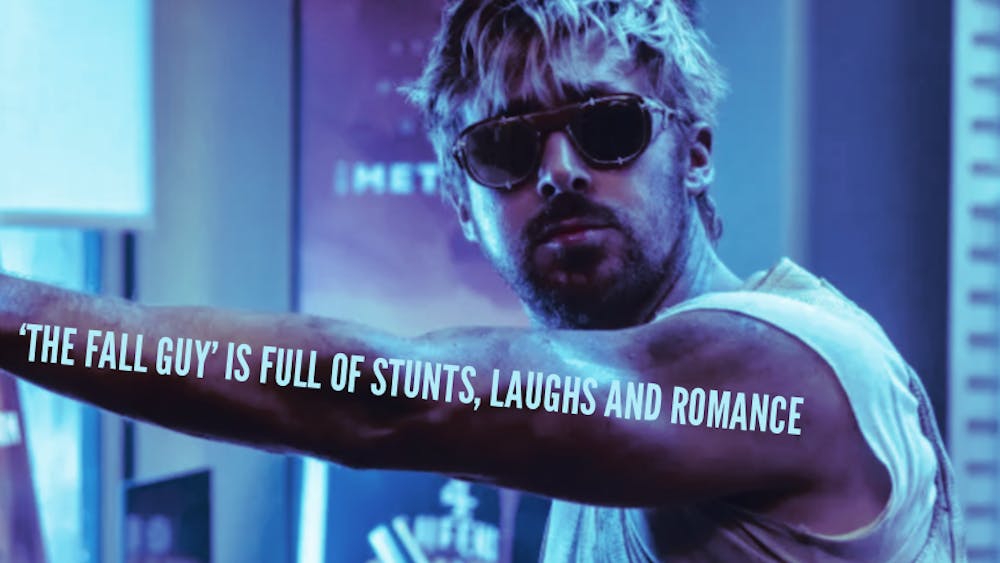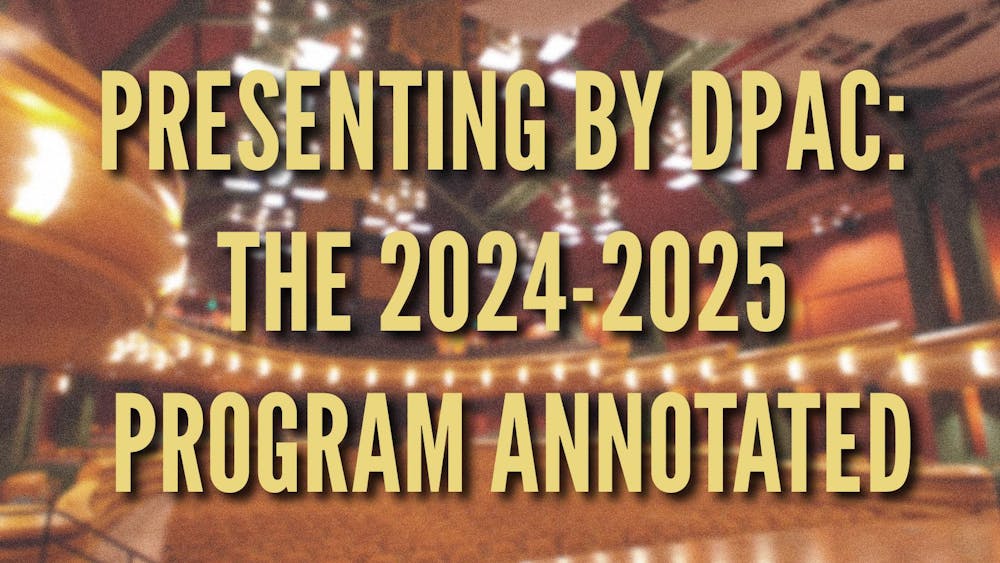Actor and Notre Dame alumnus William Mapother is bringing his latest film, "Another Earth," to the DeBartolo Performing Arts Center. Mapother plays a composer who crosses paths with a young girl (Brit Marling) after a tragic accident, which coincides with the discovery of another planet in the solar system that looks just like Earth. After premiering at the Sundance Film Festival, "Another Earth" has played in limited release throughout the United States.
Mapother took the time to speak on the phone with Scene staff writer Brandy Cerne.

Brandy Cerne: What is it like for you to return to campus? You're coming back next weekend for the screening.
William Mapother: I love coming back. I have very fond memories of my time at ND. So I love coming back. It's not only nostalgic, but it's doubly enjoyable because I have an ongoing relationship with the University in the form of coming back for shows and working with the students, so it's definitely gratifying. I've come back twice before. Once with a horror movie with Sarah Michelle Gellar called "The Grudge." And then a couple years ago or so I came back with a documentary I narrated called "Mountaintop Removal" about that destructive coal-mining process. It covers eastern Kentucky and West Virginia. Both of those screened at DPAC and I did a Q&A after.
BC: You talked about your fond memories here, which most of us have at Notre Dame. What was your experience like here?
WM: Well people often ask if I was happy there or if I liked it. The challenge in answering that is that I didn't go anywhere else, so I have nothing to compare it to. But I did. I had some growing pains in my transition to adulthood and Notre Dame was a very supportive environment for that. I lamented while I was there some of the homogeneity of the student population, but looking back I think it was helpful for me during my transition. The student population now, I believe, is a lot more heterogeneous than when I was there. The one thing that stands out for me during my time at Notre Dame was the friendships I made there and that I still maintain. I was a member of a group of about 12 guys and we're still in close contact. It's rare among old people I know who went to different universities.
BC: Besides personally, do you think that ND prepared you for your career as an actor?
WM: Well, I spent four years there and I'm lucky enough to get acting work, so I must have done something right. It was inadvertent, because I didn't study acting at Notre Dame. I was an English major, and learning to understand and interpret text certainly prepared me for acting.

BC: And then you taught for a few years after graduating, right?
WM: Yes, after graduating I was first a production assistant, which is more commonly known as a peon. They do everything on film sites. They are gophers basically. And then I worked in development and that means reading scripts, working with writers, meeting with agents. So after doing that for three years, I thought that maybe I didn't want to be in the movie industry, so I taught junior high and high school in East L.A. for a few years.
BC: So what made you make the transition to acting?
WM: I realized that teaching was not for me. It takes a very special person to be a teacher. I knew that intellectually, but it wasn't until I experienced it that really sunk in. I went to New York for a while and directed a play. I took a couple of acting classes almost as a lark and found them a hell of a lot more fun and a hell of a lot more challenging than I expected. And challenging intellectually as well. And I came back to L.A. and was lucky enough to find one of the few good acting schools. I went to a two-year acting school and started when I was 32. So I started much, much later than most actors.
BC: If I can say so, you have a history of playing somewhat creepy characters. Are you drawn to those more sinister roles or are you drawn to the other roles?
WM: No, I'm drawn to being employed. And it's a very, very competitive business. It's gotten even more competitive than ever in the last few years. And Hollywood seeks to reduce risk. Nobody knows if a TV show or movie is going to be successful. That's a very scary proposition for a business. One way to lessen the risk is to hire actors for roles you know they can play, so once you get known for one thing, they are a bit reluctant to let you try something else. And that's one reason why a lot of actors like myself do smaller independent films because they trade on the value of your face and name, and in exchange, you get to play different roles. And that brings us to "Another Earth." I play a grieving father and husband.
BC: What else drew you to the film?
WM: I hadn't read a story like this. The genesis of my involvement is kind of an interesting story. December of 2009 I was in New York at a Shakespeare lab at the public theater that puts on Shakespeare in the Park. For a full summer, they teach you to play Shakespeare soup to nuts. While I was there, I sent some casting directors' names to my manager and asked him to set up meetings. A big part of being an actor is being a self-starter. You have to be very proactive to look for opportunities everywhere, so I thought as long as I'm in New York I'm going to try and meet with some people.
I met with one casting director. There was construction on the building, it was loud and dusty, a 20 minute meeting. Very inauspicious. Two weeks later, they sent me a script in L.A. and the offer basically was, "We'd like you to play this role, it is a first time director, the actress is so new she's not even in [the Screen Actors' Guild] yet, and we're going to pay you as little as your union allows us. Are you interested?" So I read the script and liked the script, and I also liked the fact that I had never played a role like this. Also, the director and the producer, who's also the costar, sent along footage they had already shot and I could see that the director and the lead actress knew what they were doing, even if they were new and young. And finally, I met with them in person and we got along like a house on fire.
BC: You mentioned the wages. I know it was made for very little money, but it's getting a lot of attention, starting with the success at Sundance. How was your experience actually filming it?
WM: It was a fantastic experience. Our crew was so small it could have fit in a station wagon. So while on the one hand that can be a disadvantage because you have to make compromises, on the other hand there are some advantages. One is that it requires a lot of creativity from the crew. Another is that with the smaller crew and by using a digital camera, there's really more time available for shooting instead of setting up the shot. Because what requires the most time usually on a movie set is arranging the lights. Because the director shot with natural light and because we used digital, the set up time was very short. Which meant that we had more time to shoot, to explore, to improvise, to experiment. So I would far prefer having that opportunity over making more money and having a fancy trailer.
BC: It has sci-fi elements but it's not your typical sci-fi film with huge CGI, why not?
WM: Yes! You know, women traditionally run away from sci-fi, so while we can't deny the sci-fi elements, we're fond of saying it's a character drama with a sci-fi backdrop. It is really about the characters. Women in particular really love this movie. You know, the lead character is approximately your age. It's a story of redemption and forgiveness. To return to where you were headed, you're absolutely right that science fiction, especially in recent years, has become about explosions and big budgets, and this movie returns to what traditionally was science fiction, and that's the exploration of ideas and alternatives.
BC: It seems like it has really interesting themes. Do you think there are any themes in particular that will appeal to ND students?
WM: Redemption and forgiveness are hallmarks of Catholicism and Catholic education. That's the first thing. The second is the lead character is the same age as most Notre Dame students. I think they will find her situation very compelling. She is at the beginning of her life, and makes a mistake, and has to decide how to cope with the consequences.
BC: It seems like there will be many people who can relate to that, especially as we're making our transition into the real world.
WM: Yeah, and in addition, the story poses some fascinating philosophical questions. You know, what's come out in science this year. One, we're discovering that there are new universes that we weren't aware of and similarly, a book by Brian Greene, a very esteemed physicist has proposed parallel universes. When the director and the star co-wrote the script they were unaware of that, but it dovetails nicely into the release of this book and it's gotten a lot of attention.
BC: Yeah, very timely.
WM: Exactly, and it explores the question of what would you do if you met yourself.
BC: And then of course, I have to ask you about "Lost," because for many fans, I would say that the role of Ethan is pretty iconic. Even just remembering that moment of when we found out you weren't on the plane freaks me out. So what was it like to be a part of that show?
WM: It's tough to put into words and not sound clichéd or glib. It was lucky. And it was an honor. Given the quality of a lot of mainstream entertainment, it was an honor to be a part of "Lost," which proved that entertainment didn't have to be dumbed down to be popular.
BC: I agree also, I was a big fan. What can we expect to see you in next?
WM: I have an independent film coming out in December called "A Warrior's Heart" in which I play a lacrosse coach. It stars two of the actors from the Twilight series, Ashley Greene and Kellan Lutz.
BC: That also seems like a different role for you.
WM: Yeah, it is a different role. And then in January, I'm in a Lifetime movie with Rob Lowe about Drew Peterson, an infamous police officer in Illinois accused of killing two of his wives.
BC: I have seen the pictures of Rob Lowe and his new hair for that film.
WM: It's creepy how similar he looks. I also am the cofounder of Slated.com, and we are doing something that's never existed before. We've created an online platform for investing in film. We are bringing investors and filmmakers together online.
BC: How do you think that will change things in the industry?
WM: Right now there is very little capital available for independent film, and yet, there are wealthy individuals all around the country who would love to invest in movies but they don't know any filmmakers.
"Another Earth" is screening at 6:30 and 9:30 p.m. this Friday, Nov. 4, with Mapother in attendance for an introduction and Q&A.
Mapother is also appearing on "The Mentalist" this Thursday, Nov. 3, on CBS at 10 p.m.
Contact Brandy Cerne at bcerne1@nd.edu












